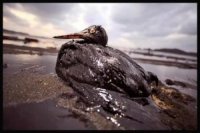- Home
- Endorsements
- Scorecard
- News
- Take Action
- Support CLCV
- About CLCV
- About CLCV
- CLCV Board of Directors
- Green Advisory Council
- CLCV Staff
- Contact CLCV
- Jobs at CLCV
- CLCV Education Fund
- Issues
- Air Quality
- Clean & Renewable Energy
- Environmental Justice
- Global Warming
- Good Government
- Green Jobs
- Ocean / Coastal Protection
- Oil & Gas
- Open Space & Parks
- Recycling / Waste Reduction
- Smart Growth, Land Use & Planning
- Toxics & Chemicals
- Transportation
- Water Quality & Supply
- Wildlife & Habitat Conservation
- Local Leagues
- Donate
Is California Prepared?

Last March the people living in communities off of the Gulf of Mexico were just like us. Their cities were thriving with fishing and tourism economies. They were known for the natural beauty of their ocean ecosystems. They didn’t know that a disaster could come and change all that.
The BP oil spill in the Gulf of Mexico painfully reminded us all of the tragedy that can come out of nowhere and leave the environment, the economy, and lives in ruin.
There are 27 offshore oil and gas platforms located off the southern California coast. How can we prepare ourselves for, or even prevent, a disaster of this nature happening to our state?
The Office of Spill Prevention and Response (OSPR), and the State Lands Commission (SLC) are the organizations that are responsible for protecting California from oil spills. In addition, should a Federal spill occur in California waters, they would represent the State in working with the Federal Government to clean up the spill. As their name suggests, it is their responsibility to work towards the prevention of oil spills and to quickly and thoroughly respond should one happen. This is primarily done using announced and unannounced drills that test response and cleanup, checking equipment to make sure it is in good condition, and reviewing contingency plans for clarity. They employ oil spill prevention specialists, environmental scientists, enforcement agents, engineers, and field inspectors in order to complete this work.
The problem is that OSPR is facing a deficit of 17% which could force them to let go of much needed employees and scale back operations. It is no wonder they are experiencing a shortfall because the fee that funds them has not been adjusted for inflation since 2002. The fee is a nominal 5-cents that is placed on every barrel of oil that passes through the state. Assembly Bill 1112 (Huffman) would raise the fee to 6.5-cents in order to keep OSPR in full operations and allow them to take on the additional project of establishing regulations that cover bunkering and lightering – the transfer of oil between vessels or refueling of a ship from a platform. Those are the very activities which are thought to pose the highest threat of a spill. The bill would also require OSPR and SLC to undergo an audit every 4 years to ensure they are using funds wisely.
The bottom line is that if OSPR and SLC cannot do their job, California is going to pay the price. AB 1112 puts the burden where it belongs, on the oil companies.
As the Member Action Campaigns (MAC) Associate at CLCV, I organized efforts that helped this bill get enough votes to pass through the Legislature. Now it’s up to Governor Brown to sign this important piece of legislation that would ensure that California is prepared for the potential threat of an oil spill.
Take action:
Call Governor Brown and ask him to sign the Oil Spill Prevention and Response Act, AB 1112, today! (916) 445-2841 ext. 0
Tags:

